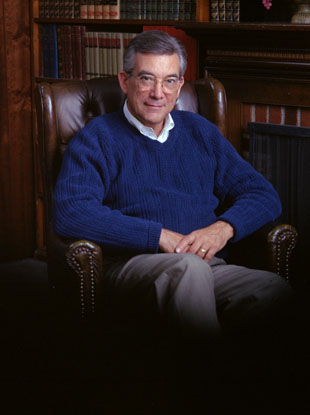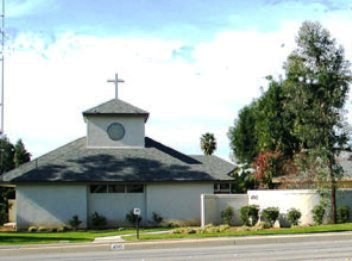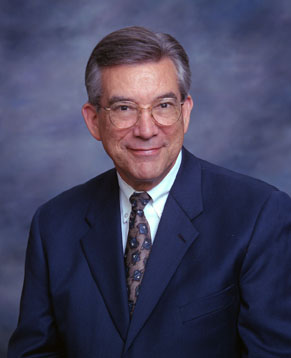
The Rev. Ron Beams in his study.
In a typical day, the Rev. Ron Beams is as likely to counsel couples celebrating a double marriage ceremony as he is a woman about to undergo a double mastectomy.
For him, “Three Weddings and Funeral isn’t just a movie; in a single day he’s actually officiated at four such services, helping people celebrate and cope with the best and worst that life has to offer.
At the altar, when he looks first at the wedding couple and then out into the audience and says, “For better or worse,” he’s knows what he’s talking about. He’s lived it.
He cares for a 40-year-old son who suffered a brain hemorrhage in 1977. A sister committed suicide in 1988. His father was taken from him suddenly by a heart attack. His mother is also spiraling down the darkening tunnel of Alzheimer’s disease. As for job loss, he has been downsized three times, by Forest Lawn Memorial Parks in 2001 after serving as director of clergy relations 16 years; by the City of Hope in 2005 after serving four years as its chaplain and lead bereavement counselor; and by Community Care Hospice, Glendora, just six weeks ago after serving four years as its chaplain and spiritual care counselor.
Rev. Beams will be bringing all that experience and more to St. John’s Episcopal Church for a four-week (April 15, 22, 29 and May 6) series, “Finding Hope in the Changes/Transitions of Life,” designed for those in the La Verne community who have experienced the death of a loved one, a major life transition (retirement, layoff, forced move/downsized living), change in family dynamics (divorce, empty nest) or change in health or mobility.
He has been the clergy liaison to Protestant, Catholic and Jewish alike and conducted sunrise services, but for four weeks in La Verne he will be ordained minister, counselor, consultant and listener to La Verne’s flock who are hurting and in pain.
A music producer, conductor and director early in life, he got into counseling to better understand his personal grief and come to grips with the “Why Me?” questions so many victims ask.
“I think a lot of us get where we are by default,” he said. After implementing Forest Lawn’s bereavement program, he felt that he could still do more so he enrolled in Loyola Marymount’s program dealing with bereavement loss and change, and earned his designation as a bereavement counselor.
With his new designation, doors for his services began opening up and he’s never really looked back. There’s a balanced polarity to his work. He probably officiates at 80 to 90 weddings a year and half as many funerals. He is the San Gabriel Valley’s on-call non denominational minister with a growing client base, fueled by high unemployment, greater numbers of people not affiliated to a particular church and the growing need, recognition and openness by people to seek help and support for their loss and suffering.

St. John's Episcopal Church, which will be hosting Rev. Ron's upcoming series.
Often he’s asked, “Where’s your home parish?” to which he replies, “You were just in it!” He’s a roving shepherd.
Although now 65 and a card-carrying AARP and Medicare member looking a little like longtime CBS newscaster Dan Rather, he’s more active than ever.
Rev. Beams deals with lots of different sources and degrees of pain. At the upcoming series at St. John’s, he knows there will be people grieving over the loss of a parent or spouse. In the same room could also be “Bob and Mary who got a call three weeks from the highway patrol that their son was killed by a drunk driver on the 210.”
Many times, somebody will reach out to him because their own family can’t or won’t.
“You may be a wife,” he said, “who has lost a father, and you might have a husband who is out of touch. He’s saying, ‘C’mon, get over it. It’s been a month. It’s time to move on.’ Now his wife can go some place where she can be heard and express those feelings even though it may not be going well at home.”
What Rev. Beams provides is a safe place for people to unburden and unload some of the grief they are living with. He tries to draw out the pain whether it’s a splinter just below the surface or a more hurtful and long-festering wound piercing their soul and psyche.
“You pray for the wisdom of God,” Rev. Beams said. “Frankly, what we need to do is to be listening more rather than speaking more, so I do a lot of listening. People need to be heard.

For more information about Rev. Ron Beams, call St. John's or visit his website at the information listed at the bottom of the story.
“I can’t tell you how many scores of people over the years that have come to support groups that I have facilitated. Some would come within weeks or months of a loss, some have waited for five or 10 years. They just buried and carried their grief and always knew they felt bad but couldn’t put a finger on why. So I try to create a place that is safe, that is educational and that is encouraging.”
Surprisingly, although Rev. Beams is an ordained minister, he explained that faith is not always enough to help people get through tough times.
“I’ve seen too many examples of people that would bury their feelings,” he said. “To use a loose-knit parallel, Christians should have hope in death because of the Resurrection … because of eternal life. There is nothing wrong with that theology. I’m a personal believer. I believe in Christ. But it doesn’t mean as a Christian, you’re supposed to bury your hurtful feelings and sadness. A lot of people will bury their suffering in their faith factor and not deal with their pain and loss. They assume their faith is going to carry them.
“In some cases it does, but in many cases it doesn’t, and they just go on being sad.”
Deeply aware that dealing with change and transition is a “very individual journey, Rev. Beams tries to provide people with better coping tools.
“I’m big on the world of tools,” Rev. Beams said. “You’ve got a little job to do, so you go out to the garage. You need a screwdriver, you need a drill, you need a hammer, you need a jigsaw to complete the job. Well, I apply the same analogy to emotional pain. What kind of emotional tools do you need?”
He said he wants to empower people to begin both the healing and closure process. “Closure doesn’t mean you wrap up the death of your father or your wife or your husband, and put it away,” Rev. Beams was careful to explain. “Closure is a process that goes on for a long time. But getting people to at least begin that process is one thing I’m going to focus on.”
Rev. Beams puts his workshop participants on a journey of self-discovery. “So many who come have not really discovered themselves … have not really found any sense of power in themselves,” he said.
For widows and widowers, in particular, he wants to take them to a better place. “There is life after death,” Beams said, careful to point out that he wasn’t talking about “life after death” in the traditional “theological, Easter or Resurrection” use of the phrase. “It means you don’t have to stay stuck in your pain for the rest of your life. It’s intended to mean that some way, somehow, you can find a new place in your life. It’s not intended for you to stay in an emotional paralysis. You need to work through it so you can be whole and well again. It’s not that you will forget that individual, but you need to recover and get back on your feet.”
Rev. Beams understands that four weeks is just an emotional band-aid, but he believes it’s still a start. He is encouraged that St. John’s, like the apostle St. Paul, is broadening its “tent stakes,” and inviting the entire community to participate, opening its doors to “whosoever will, may come.” When he suffered great personal loss, he sought help and support, and has seen first-hand how this intervention can help others.
Often those he counsels ask him what he wants his legacy to be.
“Part of me wants to say, I survived,” he said. “There is a lot that has happened in my life. There’s a lot of downside stuff. I had to have therapy years ago when my son’s brain hemorrhage was going on, with his brother (impacted by his brother’s illness) acting out of control and my sister’s suicide. Underneath, I was a very angry man. I didn’t take my anger out in violence, but I was an angry man, feeling cheated by God.
“But I’m not complaining about it,” he added. “I’m not a victim. I was able by the grace of God, and I make no apology for that statement, to work through that pain and loss.”
Rev. Beams has been successful in reaching people because he teaches instead of preaches. He shares knowledge accumulated from years of reading and study and the trials and tribulations of his own personal journey. Most of all, he listens.
“I quote the Book of James an awful lot,” Rev. Beams said. “’Be quick to listen and slow to speak.’
“People need to be heard.”
You can meet and hear Rev. Beams beginning Thursday, April 15 (he might even help you get you through the anxiety of Tax Day). A donation of $30 is suggested to help to cover the series’ expenses. Space is limited. Please RSVP to vicar@stjohnslaverne.org or 909/596-1321. To learn more about Rev. Beams, visit his website at www.revbeams.com.



Leave a Reply